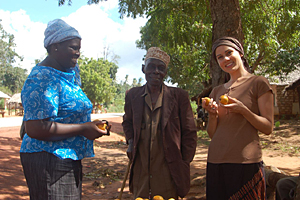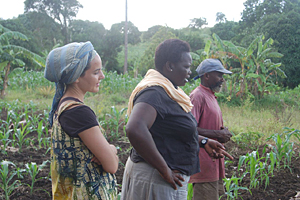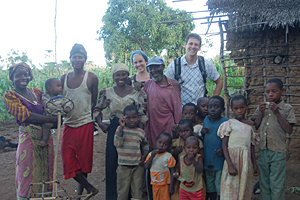ADVERTISEMENT
- Rozovsky wins prestigious NSF Early Career Award
- UD students meet alumni, experience 'closing bell' at NYSE
- Newark Police seek assistance in identifying suspects in robbery
- Rivlin says bipartisan budget action, stronger budget rules key to reversing debt
- Stink bugs shouldn't pose problem until late summer
- Gao to honor Placido Domingo in Washington performance
- Adopt-A-Highway project keeps Lewes road clean
- WVUD's Radiothon fundraiser runs April 1-10
- W.D. Snodgrass Symposium to honor Pulitzer winner
- New guide helps cancer patients manage symptoms
- UD in the News, March 25, 2011
- For the Record, March 25, 2011
- Public opinion expert discusses world views of U.S. in Global Agenda series
- Congressional delegation, dean laud Center for Community Research and Service program
- Center for Political Communication sets symposium on politics, entertainment
- Students work to raise funds, awareness of domestic violence
- Equestrian team wins regional championship in Western riding
- Markell, Harker stress importance of agriculture to Delaware's economy
- Carol A. Ammon MBA Case Competition winners announced
- Prof presents blood-clotting studies at Gordon Research Conference
- Sexual Assault Awareness Month events, programs announced
- Stay connected with Sea Grant, CEOE e-newsletter
- A message to UD regarding the tragedy in Japan
- More News >>
- March 31-May 14: REP stages Neil Simon's 'The Good Doctor'
- April 2: Newark plans annual 'wine and dine'
- April 5: Expert perspective on U.S. health care
- April 5: Comedian Ace Guillen to visit Scrounge
- April 6, May 4: School of Nursing sponsors research lecture series
- April 6-May 4: Confucius Institute presents Chinese Film Series on Wednesdays
- April 6: IPCC's Pachauri to discuss sustainable development in DENIN Dialogue Series
- April 7: 'WVUDstock' radiothon concert announced
- April 8: English Language Institute presents 'Arts in Translation'
- April 9: Green and Healthy Living Expo planned at The Bob
- April 9: Center for Political Communication to host Onion editor
- April 10: Alumni Easter Egg-stravaganza planned
- April 11: CDS session to focus on visual assistive technologies
- April 12: T.J. Stiles to speak at UDLA annual dinner
- April 15, 16: Annual UD push lawnmower tune-up scheduled
- April 15, 16: Master Players series presents iMusic 4, China Magpie
- April 15, 16: Delaware Symphony, UD chorus to perform Mahler work
- April 18: Former NFL Coach Bill Cowher featured in UD Speaks
- April 21-24: Sesame Street Live brings Elmo and friends to The Bob
- April 30: Save the date for Ag Day 2011 at UD
- April 30: Symposium to consider 'Frontiers at the Chemistry-Biology Interface'
- April 30-May 1: Relay for Life set at Delaware Field House
- May 4: Delaware Membrane Protein Symposium announced
- May 5: Northwestern University's Leon Keer to deliver Kerr lecture
- May 7: Women's volleyball team to host second annual Spring Fling
- Through May 3: SPPA announces speakers for 10th annual lecture series
- Through May 4: Global Agenda sees U.S. through others' eyes; World Bank president to speak
- Through May 4: 'Research on Race, Ethnicity, Culture' topic of series
- Through May 9: Black American Studies announces lecture series
- Through May 11: 'Challenges in Jewish Culture' lecture series announced
- Through May 11: Area Studies research featured in speaker series
- Through June 5: 'Andy Warhol: Behind the Camera' on view in Old College Gallery
- Through July 15: 'Bodyscapes' on view at Mechanical Hall Gallery
- More What's Happening >>
- UD calendar >>
- Middle States evaluation team on campus April 5
- Phipps named HR Liaison of the Quarter
- Senior wins iPad for participating in assessment study
- April 19: Procurement Services schedules information sessions
- UD Bookstore announces spring break hours
- HealthyU Wellness Program encourages employees to 'Step into Spring'
- April 8-29: Faculty roundtable series considers student engagement
- GRE is changing; learn more at April 15 info session
- April 30: UD Evening with Blue Rocks set for employees
- Morris Library to be open 24/7 during final exams
- More Campus FYI >>
8:47 a.m., April 23, 2010----When Lindsay Palkovitz was 15, she visited a poor rural area in Mexico where the villagers made their living from other people's garbage, picking through piles of trash for copper wire and other items they could sell and burning the remainder to keep warm.
“It deeply affected me to see people living like that,” she says, “and I'll never forget the smell of burning garbage. It stayed in my clothes and my hair for the rest of the time I was there.”
That experience ignited in Palkovitz a social conscience, and she has since spent time carrying out community development projects in Bulgaria, Uganda, and Kenya.
Now a graduate student in the University of Delaware's Health Promotion Program, Palkovitz plans to conduct a study examining the effects of sociocultural factors on adolescents' sexual behavior in rural Kwale, Kenya. Her ultimate goal is to design a culturally appropriate comprehensive HIV/AIDS and sex education program for adolescents in that community.
Palkovitz, who earned her bachelor's degree in anthropology at UD in 2003, is advised by associate professor Beth Orsega-Smith in the Department of Behavioral Health and Nutrition. Her trip to Kenya during UD's 2011 Winter Session will be funded by the Office of Graduate and Professional Education and the Center for International Studies through the Support for Global Research, Internships, and Performances for Graduate Students program.
“The area of Kenya that I'll be working in is a rural, polygamous society where women are marginalized and socially vulnerable,” Palkovitz says. “They have no direct access to resources and have to be partnered with men to survive financially. The incidence of rape is high, and violent and aggressive male sexual behavior is socially normalized.”
Although HIV/AIDS education initiatives have been implemented in Kenya, adolescents there continue to engage in unprotected sex at a young age. Palkovitz is aware that for such programs to be effective, they have to take into account the social mores and taboos of the society.
Her trip next January will focus on gathering data from male and female students between the ages of 12 and 15 in the six primary schools in the Kwale District, as well as from personnel in these schools, through questionnaires and focus groups.
After the proposed study is completed, Palkovitz plans to apply for external funding to support design and implementation of the education program. “Cultural relevance is critical if we expect the schools to welcome the program, the students to receive it, and the desired results to be achieved,” she says.
Palkovitz is no stranger to the Kwale District. She has been there four times for at least a month at a time, working on projects ranging from providing agricultural education to helping women set up small businesses.
“Establishing a global health perspective is important for future health and wellness professionals,” says Orsega-Smith, “and the concept is consistent with UD's Path to Prominence. Lindsay's experiences in Kenya have given her not only the desire but also the knowledge to make a difference.”
“Our health promotion master's degree program is perfect for her and other students like her who are interested in crossing into other areas such as anthropology, psychology, and public health. We require our students to take six core courses, but they can use the additional 12 credits to tailor the program to meet their specific needs and interests.”
Palkovitz plans eventually to go on for a doctorate in medical anthropology. In the meantime, she and her family -- her husband Collin and her baby, due to be born in June -- will live in Kenya for at least a year after she finishes her master's degree to implement the program she develops.
“I would ultimately like to have an academic career while also continuing my fieldwork in Kenya,” she says. “Working at a university would enable me to stay connected with the community and continue working on programs that will promote sustainability and self-sufficiency.”
Article by Diane Kukich





